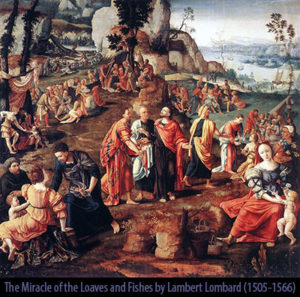The apostles returned to Jesus and told him all that they had done and taught. And he said to them, “Come away by yourselves to a desolate place and rest a while.” For many were coming and going, and they had no leisure even to eat. And they went away in the boat to a desolate place by themselves. Now many saw them going and recognized them, and they ran there on foot from all the towns and got there ahead of them. When he went ashore he saw a great crowd, and he had compassion on them, because they were like sheep without a shepherd. And he began to teach them many things. – Mark 6:30-34
I’ve always found something deeply moving about the line that Jesus “had compassion on them, because they were like sheep without a shepherd.” Mark counts on us having read Matthew and Matthew adds a few more details in his record: “because they were harassed and helpless, like sheep without a shepherd.” We don’t know anything about Jesus that we don’t learn from the bible (which is sometimes a shocking thought to recall!). Here in Matthew and Mark the bible gives us insight into Jesus’ personality. He has compassion on people who are tormented and running about desperately.
The phrase, “sheep without a shepherd,” is not just poetic on the part of the gospel writers. It is a regular biblical way of referring to the people of Israel when they have no godly leader. For example, read over Numbers 27:17; 1 Kings 22:17; Ezekiel 35:5; Zechariah 10:2.
The passage copied above is really a continuation of the story of the Twelve being sent out on their first mission. Mark interrupted that story with the story of Herod Antipas and John the Baptizer’s beheading (a sandwich story). A big insight we get from the relationship of the two stories is that of shepherds and sheep.
Herod is in his palace, probably down on the south side of the Sea of Galilee enjoying erotic dances from girls (even family members!), beheading prophets, and partying it up. Yet here are “his” people desperate for a godly leader, a righteous and effective king, running along the shore of the Sea trying to get at Jesus. The text says Jesus “began to teach them many things.” He knew what they needed most of all was good teaching on the law and the prophets and the kingdom that was at hand.
After that, they are going to feast on the loaves and the fish. Feasting has already been established as central to Jesus’ ministry (He eats with tax collectors and sinners!). Herod also feasts—where the saints are on the table. John’s head on a platter is not simply a gruesome detail; it established King Herod as the complete opposite of the greater King David. Jesus is the good shepherd who lays down His life for His sheep. For King Herod, his flock is simply livestock to supply his table.
When you come into worship every Lord’s Day, it should shock you that there is a table of sacrifice and you’re not on it. The Great Red Dragon wants to put you on it, but can’t because Jesus is there instead. That’s what the Greater King David does. He lays down His life so that the sheep without a shepherd not only will get the shepherd they need, but will not be devoured by the great enemy. And that’s the gospel!
